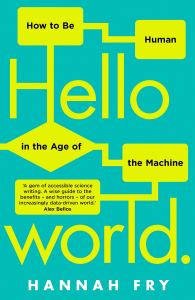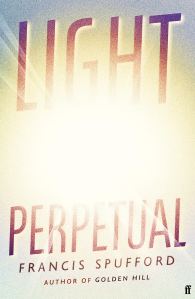 Hello World by Hannah Fry, subtitled ‘How to Be Human in the Age of the Machine’ looks at the role of algorithms in modern life, from our everyday internet use to the justice system to creating works of art. Most of the discussion around algorithms tends to focus on the negative impact they can have with sat navs sending drivers off the edge of a cliff and data privacy concerns being two of the most well-known examples. Fry also looks at the positive benefits of algorithms as they are undoubtedly useful in research contexts such as monitoring cell patterns in order to diagnose cancer earlier. The real-world examples of how humans interact with algorithms are concisely written and this is an engaging popular science book which is straightforward enough for a layperson to grasp as an introduction to a complex topic.
Hello World by Hannah Fry, subtitled ‘How to Be Human in the Age of the Machine’ looks at the role of algorithms in modern life, from our everyday internet use to the justice system to creating works of art. Most of the discussion around algorithms tends to focus on the negative impact they can have with sat navs sending drivers off the edge of a cliff and data privacy concerns being two of the most well-known examples. Fry also looks at the positive benefits of algorithms as they are undoubtedly useful in research contexts such as monitoring cell patterns in order to diagnose cancer earlier. The real-world examples of how humans interact with algorithms are concisely written and this is an engaging popular science book which is straightforward enough for a layperson to grasp as an introduction to a complex topic.
 Patient by Ben Watt is a short memoir first published in 1996 detailing the Everything But The Girl musician’s diagnosis of the rare life-threatening auto-immune disease Churg-Strauss syndrome. Doctors were baffled by Watt’s debilitating symptoms which saw him hospitalised for two-and-a-half months in the summer of 1992 just before he was about to embark on a tour overseas. The disease triggered by an unknown allergen caused his immune system to attack the blood vessels serving his small intestine, most of which was unable to be saved during surgery. As well as the disease itself and the frustration of not knowing what is causing his symptoms for such a long time, Watt writes about the experience of his long stay in hospital. It’s fair to say the NHS of the early 1990s feels a long way away from where it is at the moment, and also serves as a reminder that from now on there will be a very clear divide between medical memoirs written pre- and post-pandemic. The medical details are grisly, yet Watt’s writing is understated in this short and direct account of serious illness.
Patient by Ben Watt is a short memoir first published in 1996 detailing the Everything But The Girl musician’s diagnosis of the rare life-threatening auto-immune disease Churg-Strauss syndrome. Doctors were baffled by Watt’s debilitating symptoms which saw him hospitalised for two-and-a-half months in the summer of 1992 just before he was about to embark on a tour overseas. The disease triggered by an unknown allergen caused his immune system to attack the blood vessels serving his small intestine, most of which was unable to be saved during surgery. As well as the disease itself and the frustration of not knowing what is causing his symptoms for such a long time, Watt writes about the experience of his long stay in hospital. It’s fair to say the NHS of the early 1990s feels a long way away from where it is at the moment, and also serves as a reminder that from now on there will be a very clear divide between medical memoirs written pre- and post-pandemic. The medical details are grisly, yet Watt’s writing is understated in this short and direct account of serious illness.
 Light Perpetual by Francis Spufford is the author’s second novel following his 2016 debut Golden Hill. Set in the fictional south London borough of Bexford, it imagines the lives of five people at 15-year intervals over the second half of the 20th century if they hadn’t been killed by a V2 rocket at a Woolworths shop in 1944 when they were children (based on a real attack in New Cross). There is a lot packed in with the highs and lows of the lives of all five characters across an important period of social history in Britain. However, as a work of speculative fiction, it’s a bit unsatisfying because Spufford doesn’t introduce any other alternative “what if?” paths for the characters other than their fate in the first chapter. I can see the point Spufford tries to make about all the things the characters go on to do in their lives, but the concept doesn’t strike me as entirely necessary. Without the knowledge that they could have been snuffed out in an alternative life, it is simply a novel about five people all from the same area of London. Many thanks to Faber and Faber for sending me a review copy via NetGalley.
Light Perpetual by Francis Spufford is the author’s second novel following his 2016 debut Golden Hill. Set in the fictional south London borough of Bexford, it imagines the lives of five people at 15-year intervals over the second half of the 20th century if they hadn’t been killed by a V2 rocket at a Woolworths shop in 1944 when they were children (based on a real attack in New Cross). There is a lot packed in with the highs and lows of the lives of all five characters across an important period of social history in Britain. However, as a work of speculative fiction, it’s a bit unsatisfying because Spufford doesn’t introduce any other alternative “what if?” paths for the characters other than their fate in the first chapter. I can see the point Spufford tries to make about all the things the characters go on to do in their lives, but the concept doesn’t strike me as entirely necessary. Without the knowledge that they could have been snuffed out in an alternative life, it is simply a novel about five people all from the same area of London. Many thanks to Faber and Faber for sending me a review copy via NetGalley.
 Ordinary People by Diana Evans was shortlisted for the Women’s Prize for Fiction and the Rathbones Folio Prize in 2019. It tells the story of two middle-class black and mixed race couples in their late 30s living in South London with most of the novel set between late 2008 when Barack Obama wins the US presidential election to summer 2009 when Michael Jackson dies. Michael and Melissa live in Crystal Palace with their young daughter and new baby son and Stephanie and Damien live further out in Dorking with their three children. The main characters all undergo various degrees of existential crisis as they approach early middle age and Evans is particularly good at detailing everyday domestic disputes and how they unconsciously factor into wider resentments in relationships all too easily. This isn’t exactly unique material for literary fiction, but Evans has created convincing characters and an interesting gothic twist towards the end of her compelling third novel.
Ordinary People by Diana Evans was shortlisted for the Women’s Prize for Fiction and the Rathbones Folio Prize in 2019. It tells the story of two middle-class black and mixed race couples in their late 30s living in South London with most of the novel set between late 2008 when Barack Obama wins the US presidential election to summer 2009 when Michael Jackson dies. Michael and Melissa live in Crystal Palace with their young daughter and new baby son and Stephanie and Damien live further out in Dorking with their three children. The main characters all undergo various degrees of existential crisis as they approach early middle age and Evans is particularly good at detailing everyday domestic disputes and how they unconsciously factor into wider resentments in relationships all too easily. This isn’t exactly unique material for literary fiction, but Evans has created convincing characters and an interesting gothic twist towards the end of her compelling third novel.





I think I kept confusing Ordinary People by Diana Evans with Normal People by Sally Rooney. Didn’t they come out kind of around the same time? Well, either way, Ordinary People is going on my TBR list –where I had thought it had already been. The medical memoir sounds horrifying; I do like them occasionally, but not right now!
LikeLike
You’re right, Rooney’s novel did come out around the same time as Ordinary People. And I can definitely understand why some people might not want to read medical memoirs right now!
LikeLiked by 1 person
I hadn’t heard of the Watt but it looks right up my street (of course). I just picked up a copy of Light Perpetual from the library today and will start it tonight and see what I think. I saw him give a reading from it at an online festival the other week and was impressed. It certainly does sound different from Golden Hill, though. The Evans was a standout from that year’s WP list for me.
LikeLike
Yes, I think you’ll like Patient by Ben Watt, and Light Perpetual is certainly different from Golden Hill!
LikeLike
Light Perpetual was on the radio. Very different from Golden Hill, but I liked the details that made the characters feel like ordinary real people. I could sense an alternative to the What If scenario, which has been played out many times, in that a loss might have been conveyed as the characters vanished in the end, but it didn’t quite make it that far into my emotions.
I enjoyed the way Ordinary People played with the idea of race – if you are not White British, you regard yourself as an ordinary person and everyone else as different. But then you realise life isn’t as simple as that. Also a book where I enjoyed the detail of people’s lives.
LikeLike
Yes, that’s a good observation about Ordinary People – I thought it was a very well written novel.
LikeLike
Pingback: The Booker Prize 2021 Longlist | A Little Blog of Books
Pingback: Books I Read in March 2023 | A Little Blog of Books